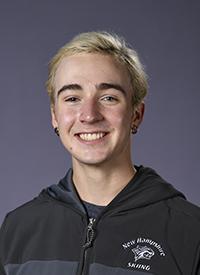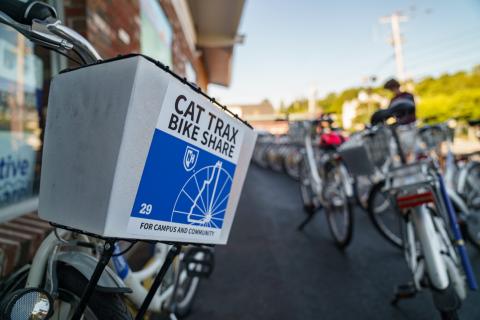Cat Trax: A Student Intern Shares Their Perspective on the Campus Bike Share Program
UNH is working to bring a bike share program, Cat Trax to the community. After two decades of multiple attempts to establish one, new technology makes the initiative possible. The Sustainability Institute has been partnering with Transportation Services and Campus Services to adapt a model based off the widespread Citi Bike system found in urban areas. Oyster River Cycle and Sport and UNH Special Projects Director Steve Pesci also are playing instrumental roles in the collaboration.

Nathan Maybach ‘25 (Women’s and Gender Studies major) was among those spearheading the project as the Sustainability Institute's bike share intern.
I caught up with Nate recently to hear more about their role in the program, and some of the successes and challenges behind the project.
How did you become involved in the Sustainability Institute?
I met with Faina Bukher (Changemaker Collaborative Program Director) last year to talk about student involvement opportunities, including the Changemaker Collaborative. I applied for an SI Zero-Waste internship, but Jade Chalkley at SI reached out to me about a new bike share program launching. A few years ago, I wrote a research paper about bike shares as a public health initiative, as well as the benefits of bike lanes to cities. I immediately said yes to the opportunity because I was so passionate about it, and started working virtually on the project in June 2022.
Is this your first year?
Yes! Next year, I’d like to return to SI either as a SIMAP intern or do Semester in the City.
What was the vision behind Cat Trax?
The vision was to bring accessible, environmentally sustainable transportation to UNH. Cat Trax will be free for the first hour for students, meaning that our goal was not to make lots of money off of the project, but instead to make it as easy as possible to find a ride. By partnering with a local bike shop, Oyster River Cycle & Sport, we're able to bring the project up to speed more quickly and efficiently than with just UNH and bring the benefits to the program of the general Durham community.
What did your role in this project look like?
I have a few roles in Cat Trax development! My primary role is marketing and creating the materials that the students and community will see about the project. This includes the website content, logo, graphic, placard, and other elements. I’ve also been working on the hardware side, as I’ll be doing weekly bike maintenance surveys in the future and ensuring that the app and the bikes are paired successfully. When we were creating the project, I also did research on other bike share programs, what made them successful, and what an equitable price to charge for the services would be.
What are some of your reflections on this project?
A project like Cat Trax is incredibly important to communities like college campuses. After announcing the project, we’ve had so much excitement from students, faculty, and staff alike, and loads of people registering for the app, which means that accessible transportation is truly a paramount issue in sustainable development. The amount of people that have been talking about the program daily truly makes me even more passionate about the project.
What were the biggest challenges for you in getting this program launched?
Some of the biggest challenges we’ve had is on the software side. Brian at Oyster River Cycle and Sport (ORCS owner and UNH service provider for operating Cat Trax) and Jon Moore (one of the project leaders, from UNH Campus Services) have been working tirelessly to debug some of the current issues.
What were things you wish you knew before starting the project?
I wish that I knew how many people would be involved with the project. For example, I never envisioned that we’d be reaching out to UNH General Legal Counsel in order to draft the terms of conditions. This project showed me how important collaboration is for team management, as well as how different departments at the University function. While having a variety of partners means we can finish massive projects relatively quickly, it also means that it is really important to communicate in an effective manner.
Anything you want students to know about the program?
A lot of students have asked where we are in the development of the program, and the answer is: we’re getting close! Be on the lookout for updates from the Sustainability Institute.
